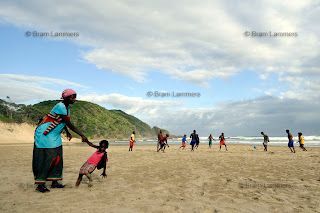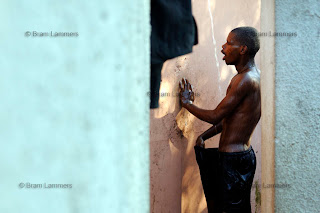Second Beach, Port St. Johns, is home to a team of young men who are negotiating the contradictions between tradition and modernity, an inheritance over which they have little influence or control.
Work opportunities are limited for the players, nearly all are undereducated and unemployed, and the deeply entrenched poverty, product of the region’s turbulent history, is the root of many social ills. Some players have been involved in drugs, gangs and crime, alcohol abuse, some come from broken homes.
And yet the young men have found one arena where they can be their own masters.
They are the Skom Boyz, from Mtumbane who have laid claim to the beach because their village’s geography is such that there is no suitable place for a field.
The brainchild of the young men of the village, the team was started in 2003 as a means to keep the young men active and out of trouble.
And while the all of the players agree that there is great potential in soccer to keep the youth of their village out of trouble, not all of them are able to stay focussed and apply this at all times in their own lives.
But soccer is a glue that bonds the Skom Boyz together in things positive, a shield against the challenges they face. It is a philosophy that is embodied by the team captain and big brother, an intense young man, zealous in his passion for soccer and youth.
“Soccer can only unite people, it can never divide!”
“I don’t want to work for money, I want to work for the minds of the people, the kids…You see, knowledge is power. Sometimes I don’t mind about money because when I need it I can make a plan. But knowledge, knowledge opens up the world.”
Together with some of the dedicated senior players, he does his best to keep the team in the local league and together as a unit.
Sitelo’s father passed away when he was very young and so he was raised by a single mother. And yet today, without really having knowing a father, he has become a father figure to the young men of his team.
One of the older players, Pharaoh, lost both of his siblings to Aids and in 2006 his mother passed away. He is alone and because of failing to finish school, his long term prospects are limited. His circumstances bred disillusionment which turned to anger.
“Zwai changed my life. I used to drink and was full of anger, I was violent. But he sat me down and talked to me, he told me to be patient in life. I learnt to control these things.”
On the fridge in Sitelo’s one roomed house is a message which could be his driving force:
“From the spirit of my being, I now give myself permission to feel any fears, to see, to know and understand what these fears are about. I also give myself permission to experience them in a loving, peaceful, painless, and joyous way. So be it and so it is…”
The challenges are many. Discipline is erratic, particularly among the younger players, and it is hard to retain members and recruit new ones.
“They take us for a joke sometimes,” says Castle, “because of our old uniforms. Instead they go to the taverns and drink.”
The team’s uniforms are old and tattered having been donated many years ago by Irish travellers who spent time at Second Beach’s Amapondo Backpackers. There are no resources to buy new uniforms as available money is spent on paying league fees and transport to matches.
And yet Sitelo is unshaken. While he prays for support or a sponsor he will not give up and he is adamant they don’t want charity. “We want a hand up, not a hand out!”
A ball and the beach are the minimum that the Skom Boyz need and in this place of action the words on their Facebook group capture them best:
The Skom Boyz’ story is but one of many in South Africa, indeed in the world. Theirs is a story of doggedness and small triumphs inside of adversity and the power of sport in difficult places. It is a story of young men taking control of an aspect of their lives and walking tall while doing so. It is a story of the deep love for soccer and its deep social impacts in South Africa.
And so the ocean waves gently pick up and carry off the many pieces of broken glass on Second Beach. Rocking them back and forth, the water peels away jagged, angry edges, making them smooth and gentle. The rhythmic rubbing removes the outer layers releasing a rough beauty that was previously obscured beneath.
As the waves are to broken glass, so is soccer to the Skom Boyz. Such is the beautiful game to a nation. And as of Friday, so is it to the world.
Photos by Bram Lammers - www.bramlammers.com
SABC1 Thursdays @ 18h30
21 April – episode 6 - Sports Facilities
Mzwandile Sithelo is a star player and facilitator for
Skom Boyz, a team of football players from the Mtumbane Village in Port St
Johns. The team plays football every weekday afternoon on Second Beach close to
their village, as no other area is suitable in this hilly environment to play
soccer. For six years however, they have had their eye on a patch of municipal
land that could be developed into a soccer field. Their vision is to create a
community centre around the field, so that it could be used as a space for
youth to play soccer, hang out, develop and play other sports and youth
activities. A formal request that was made by Zwai and his ward councillor
towards the end of last year was turned down by the municipality. Mo
accompanies Zwai to the municipal manager’s office, Zola Hewu, to find out why
and what his further options are. He also talks to ward Councillor Alfred
Ncoyini, to find out what avenues are open to young people when they want to
develop something in their area.













2 comments:
Beautiful! Really special to see how much can be done by some with so little...
Fantastic story that reminds me that human bonds count more than anything else to lift people up.
Post a Comment